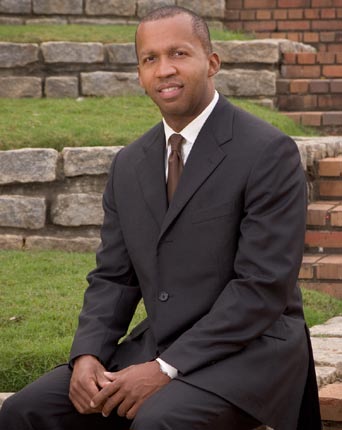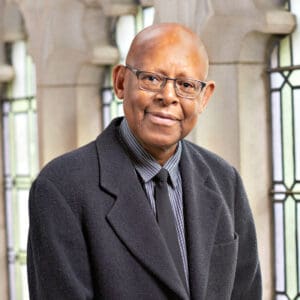 Editor’s Note: The film Just Mercy opens in theaters everywhere on January 10th. Featuring the story of lawyer and Eastern University graduate Bryan Stevenson, the film is a moving and powerful commentary about racial injustices on death row. In anticipation of the film’s release, we’re re-running Laura Coulter’s interview with Bryan Stevenson in PRISM magazine in 2014.
Editor’s Note: The film Just Mercy opens in theaters everywhere on January 10th. Featuring the story of lawyer and Eastern University graduate Bryan Stevenson, the film is a moving and powerful commentary about racial injustices on death row. In anticipation of the film’s release, we’re re-running Laura Coulter’s interview with Bryan Stevenson in PRISM magazine in 2014.
Even 25 years ago, $500 wasn’t enough to hire a good ballistics expert. But that’s all the state of Alabama would cough up for Anthony Ray Hinton to prove that his gun wasn’t the one used in a 1985 double murder. The ballistics expert Hinton was able to afford was blind in one eye and had never used the equipment required to run the necessary tests. Between this meager fund and the payment to his public defender—a payment capped by law at $1,000 for out-of-court work—Alabama got a bargain basement deal of $1,500 on Anthony Ray Hinton’s trial. The defendant wasn’t so lucky. In spite of an ironclad alibi and the fact that the state’s one eyewitness was discredited, Anthony Ray Hinton got the death penalty.
This was a case tailor-made for the Equal Justice Initiative, a nonprofit that defends indigent prisoners and those who have been denied just treatment in the legal system. In 1999, after more than 15 years on death row, Hinton welcomed EJI to his case, which is currently winding laboriously through the appeals system. Bryan Stevenson spearheads the Montgomery-based EJI, which has embraced many controversial and difficult cases since its inception in 1989.
A committed Christian, Stevenson has been working since law school with indigent and marginalized people caught in the cross hairs of the judicial system. Instead of reaping the financial benefits of his top-tier education and launch at a private law firm in the Northeast, Stevenson moved to Alabama, a state that boasts one of the highest death penalty rates and some of the most shameful racial legacies in the United States.
You’re a graduate of Harvard Law School and Harvard School of Government. You could have gotten a job anywhere you wanted, but you chose to do this instead. Why?
Bryan Stevenson: I’m also a graduate of Eastern University, and I really wanted my work to be integrated with my worldview. I went to law school without a clear sense of whether I wanted to be a lawyer or not. I was very passionate about the plight of the poor in this society, of people of color, of people who are disfavored. While in law school I looked for opportunities to explore my interest around that, and I had an opportunity during my second year to work with the Southern Center for Human Rights in Atlanta, Ga. I went there and observed their work for death row prisoners. I met someone on death row and started looking at these cases, and I was just incredibly compelled by the work. I mean, these were people who were literally dying for legal assistance.
The quality of legal aid they were receiving was so shockingly poor that even though I didn’t think of myself as a serious law student at the time, it became clear that I could do something that could substantially help. And it was a forum that created an opportunity to talk about poverty and race and redemption and human value and justice and all of these inconsistencies in American life and politics and economic structure and in the American church. I started working with the clients on their cases while I went to law school, and when I graduated, it made absolutely perfect sense to continue doing that work. I’ve been doing it ever since.
In what ways does your faith inform the work that you do?
Stevenson: Well, in several ways. I grew up in kind of a marginalized community where faith was central to how people reconciled themselves to a disfavored status. For me, faith had to be connected to works—you have to do something with what you believe in some way that reflects and expresses your belief. Faith is connected to struggle; that is, while we are in this condition we are called to build the kingdom of God. We can’t celebrate it and talk about it and then protect our own comfort environment. I definitely wanted to be engaged in something that felt redemptive.
So much of what I do is a reaction to what I characterize as a profound absence of hope. I think we condemn people in this society because we are hopeless about the potential for human redemption and rehabilitation. We execute people because we are hopeless about our capacity to achieve restoration and reform. For me, faith is about rejecting all of that stuff and engaging problems with some hope and not accepting the kind of hopelessness that legislators and politicians and judges have embraced. That is the broader way in which it has informed and shaped my work. A more immediate way is that I’m really comfortable with measuring my level of success and my ultimate reward in terms of things that are non-material.
To me, if I can feel affirmed and energized by what I’m doing with someone in crisis within an institution that’s corrupted by power, if I can feel engaged in some process of transformation in dealing with these problems, then I feel really, really, fortunate. Yes, I had options that maybe some people don’t get, but if you do something you’re not engaged by just for money, it’s not dramatically different from someone who doesn’t have many options. So for me, options just create a responsibility to be purposeful and thoughtful about what you’re doing.
One of the major social groups that oppose your fight against the death penalty is evangelicals. But in theory, they too believe in redemption and share your concept of God. Why do you think that is?
I’ve never met anybody about whom I could say, “This person is beyond redemption—his life has no value, no meaning, no purpose—and it is morally justifiable to kill him.”
Stevenson: I don’t know. I worry about what I would call institutional Christianity—cultural preferences and political perspectives that are cloaked in Christian garb but which underneath don’t seem very integrated. I don’t want to be critical of other institutions, but I am critical of the way the church is sometimes used that is wholly inconsistent with the teachings of Christ. We’re not forced to explain ourselves if we say we’re a Christian organization and our top goal this year is to fight tax increases, which is what we see so much of in this state.
I spend a lot of time talking to evangelicals, some of whom I think come from very conservative communities, and so much of what I encounter is a real lack of thought. This notion that God is Republican, and therefore every Republican speaks for God—it’s scary how comfortable some folks have gotten with that. Obviously Christians are called to reject the notion that God’s a Republican or a Democrat, that God belongs to us and to no one else, that our Christianity is intended to justify morally our pursuit of wealth and power and our distance from the problems of the poor and disadvantaged. To me that just doesn’t settle with the life of Christ. At a minimum, I think we need to talk about these things.
I’ve heard spokespeople for evangelical organizations make the argument that God not only permits the death penalty but actually requires it. What’s your response to that?
Stevenson: I’d say it’s not, in my view, an integrated understanding of the Scriptures. Jesus says, when asked about the death penalty, “Let him who is without sin cast the first stone.” It doesn’t say it’s absolutely not permissible. I think what Jesus says (and what I believe) is that the question about the death penalty is not “Do some people deserve death for the crimes they commit?” but rather “Do we deserve to kill?” Are we so perfected, so beyond sin, so comfortable in our condition of grace that we are now capable of picking up the stones and throwing them? Jesus understood that we are never in that condition. We are saved by grace. We are perfected only through love and through daily acts of redemption and suffering and struggle and prayer and reflection; we never get to the point where we can act on this arguably permissible, scriptural authority to kill. Evangelicals say we believe that we’re put on the planet to spread the gospel and share the love of Christ, but to me it’s wholly inconsistent to be committed to that task and yet to want a secular government to eliminate folks before that act of ministry and reconciliation can be completed.
I am thoroughly convinced by the transformations that I see in people. I don’t believe that anybody is beyond the grace of God. I’ve known a lot of people on death row about whom I could say, “This person is ill” or “This person may never be in a position to be released,” but I’ve never met anybody about whom I could say, “This person is beyond redemption—his life has no value, no meaning, no purpose—and it is morally justifiable to kill him.” And I certainly have not encountered a system of government or government officials about whom I could say, “These folks have it together; they are so beyond discrimination against the poor, so infallible that they should absolutely decide who lives and who dies.”
We don’t deny that we’ve got clients who’ve done horrific things that deserve really severe punishment. We just don’t think that a state like Alabama, or Mississippi, or Georgia, or Pennsylvania, or New York, or California has the capacity to exercise these perfect judgments. Because when you kill a human being, you can’t make mistakes—it requires perfection.
Alabama has more churches per capita than any other state in the country, yet it sentences more people to death than any other state. Is there a relationship?
Stevenson: I think there’s something really corruptive at play in a lot of our churches. We have politicians, both locally and nationwide, who are preaching fear and anger. They don’t want Christians and people of faith thinking about how to love, how to restore, how to serve, how to respond to the suffering of those without. They want them angry. They want them angry about Hollywood and angry about people who are gay and angry about liberals and angry about taxes. They want them fearful of crime and fearful of terrorism and fearful of all these threats. That then yields social and political policies that are very predictable. What that will give you is a desire for the death penalty, support for mass incarceration, resistance to social justice, indifference to the poor, contempt for those who are disadvantaged and marginalized. This explains how we can be so saturated with churches and religious institutions and yet so silent on social justice issues and so lax in doing the things Jesus called us to do.
The same level of religiosity, the same number of churches existed when we were comfortably defending segregation in this state. Churches have comfortably defended segregation and Jim Crow laws and comfortably tolerated lynching. Many of them comfortably accepted slavery. The comfort level of religious institutions and people expressing Christian ideology in the face of horrific human suffering, tragedy, and abuse has some historical antecedent. It’s only when we get past that—usually because we’re pushed by somebody who’s not necessarily a person of faith—that we begin to come around. Any meaningful conversation about where we are has to focus on this: Why have we so frequently allowed ourselves to sit silently in church pews while horrific abuses and injustices and evil are being tolerated, oftentimes with our support? That’s the challenge, I think, for all of us, because we’ve seen the church do so many things that undermine the kingdom of God. Human history is filled with volumes of gross abuse and evil, all in the name of God. Unfortunately, people are still very comfortable using God and Christianity to legitimate conduct that is very ungodly.
The number of really tragic, unjust cases that you deal with must be overwhelming. Which case has affected you the most personally?
Stevenson: Each case is compelling in its own way. Some get more attention than others, just because of the nature of the issues, but for me they all have their own little room in my heart and are equally and infinitely important.
A lot of us really deprive ourselves of opportunities for incomparable joy and extraordinary spiritual affirmation and meaning when we shield ourselves from engaging people who are in crisis, suffering, sick, in prison.
How does your own faith not founder when you see terrible injustice?
Stevenson: There are definitely days when I am dispirited by what appears to be the permanence of so much injustice. That is part of the struggle. I am suspicious of anyone who doesn’t drop a few tears along the road, because I would question whether that person was seeing everything that needs to be seen.
But the good thing is that when you look back, you realize there are all these formative things that have happened. We are told that every valley shall be exalted, crooked places will be made straight, rough places will be made plain, and with that history it becomes a lot easier to say, “Yeah, this is unacceptably, unbearably bad and wrong, but I’m not the first person to have confronted that.” For me, faith is acknowledging that and still pressing on. In my church growing up, when something really horrible confronted you— you lost someone important, your house had burned down, or you didn’t know what you were going to eat the next day—that’s when you would stand up and sing, “I wouldn’t take nothin’ for my journey now.” Because in that struggle there is an opportunity for triumph. And the triumph deepens you, and your capacity to overcome grows. If you run from that, you might not experience all the pain but you don’t get the triumph either.
That’s what I talk about with people like my young clients and folks who are really struggling. And it’s also the way we go about our jobs here at EJI. We struggle here. It’s hard to raise money and train folks and supervise them. You move from season to season, but rather than say, “I don’t feel weak today, I’m not tired,” I say, “I am tired. I feel bad. That really hurt. That was incredibly dispiriting.” You have to acknowledge and be honest about the struggle.
What would you like our readers to know about the work you do or your approach to justice?
Stevenson: One thing is that a lot of us really deprive ourselves of opportunities for incomparable joy and extraordinary spiritual affirmation and meaning when we shield ourselves from engaging people who are in crisis, suffering, sick, in prison. What I’d like to communicate to everyone is that if you get proximate to death row prisoners, to people who are struggling, and you just bear witness to their struggle and assist them when you can, there is this extraordinary redemptive experience that will reach you. Don’t go into it thinking that you’re doing this for somebody else; understand that you’re doing this for yourself, because I guarantee you’ll get more from it than you’ll give. I think when we shield ourselves from those sort of experiences we deny ourselves a lot of miraculous redemptive excitement that being a person of faith can offer us. Another thing, with specific regard to EJI, is that we are empowered whenever people affirm, support, encourage, or embrace any aspect of what we’re doing. Then our capacity to affirm, encourage, and uplift the people we serve is just unlimited.
Watch Bryan Stevenson’s 2012 TED Talk, “We need to talk about an injustice“
Watch Bryan Stevenson on The Colbert Report.
Laura Coulter is an Alabama-based writer who has covered many U.S. justice issues for PRISM in past years, from Guantanamo Bay to the juvenile correctional system.


